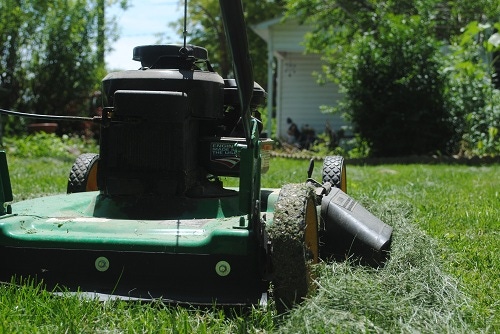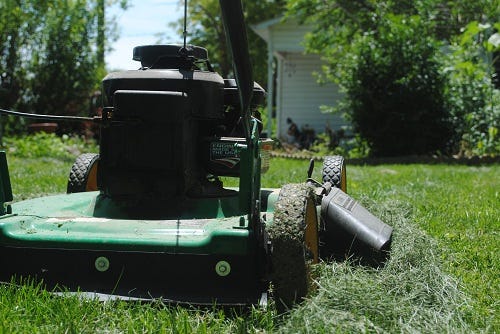
I have never won a “best lawn” contest. I’m a tree guy. I like cottonwood, hackberry, oak, maple and walnut. I like the leaves above my head. My lawn is an afterthought. My wife mentions in dismay something about being thankful we live on a farm where we are the only ones that have to look at our lawn.
It is neglected, by most suburban standards. My brother, who has spent a good share of his professional life in the lawn care business, gratefully keeps to himself when he visits, because I’m sure he shakes his head in disbelief when he drives off the place.

SWATHING: My little lawnmower gets a real workout on my neglected farm lawn.
When I was swathing…I mean “mowing,” my lawn yesterday, and was considering hiring my neighbor to pull in the yard with his baler to roll up the excess forage for my cows, I was also thinking about the manicured lawns I see in most suburban settings.
Recent studies have shown that most urban dwellers that tend lawns don’t really use their grass. They manage their grass for purely aesthetic reasons. A perfect lawn feeds their psyche.
Around our farm place, the lawn is used heavily. We play ball on it. Roll on it. Play tag on it. There are huge bare areas where my children play on the swing set in the middle of our front yard. These activities are good for our psyche too.
While farmers get a bad rap for pesticide use in their paltry endeavors to feed the world, suburbanites who pour on up to 10 times more pesticides per acre than farmers depending on the survey or report you are reading, mostly get a pass.
Farmers understand how to properly apply herbicides and insecticides. Food producers are generally highly trained professionals, and are knowledgeable about preventing pollutant problems in surface and ground water, because they live where they farm. They don’t want water pollution any more than anyone else. They understand the importance of farm filter strips and vegetative treatment areas, and how to use conservation and precision technology to get the most from their chemical inputs. Farmers have been in the business of protecting and preserving natural resources for a while.
However, over the 30 to 50 million acres of tended lawns in the country, pesticides are applied by many home owners who may not understand the importance of following labels and application restrictions. To be fair, there are new organizations working to reduce this and lawn care professionals do receive training in proper use and application.
I just think it is a bit hypocritical for some folks to point fingers at farmers for polluting, as they blindly apply excess chemicals on their lawns that do not feed anyone or help the common good.
It is a classic case of folks needing to look in their own backyards, literally, before pointing fingers at their farming neighbors. But don’t look too closely at my backyard, please, at least not until I’ve baled up my latest cutting.
About the Author(s)
You May Also Like






